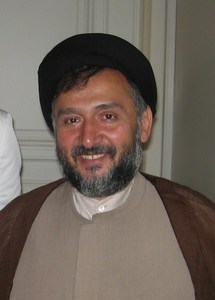
Abtahi had told the court that he should not have taken part in protests as there had not in fact been any fraud in the June 12 poll, which returned Mahmoud Ahmadinejad to office for another four years.
Abtahi's backdown, which was followed by similar statements from other reformists among some 100 people facing charges of rioting, dealt a blow to the opposition movement which claims that Ahmadinejad's re-election was due to massive rigging of votes.
Abtahi's wife, Fahimeh Moussavinejad, said in a statement posted on an opposition website that her husband "was not in a normal state" while giving testimony and that it seemed he had made the statements under the influence of medications.
"This is an insult to the intelligence," Abtahi told state television when asked if he had indeed made his statements under the influence of drugs.
"I addressed serious questions about the political situation in the country, the question of the fraud, which arose after the election, the damage suffered by the country, these are very serious issues," Abtahi said.
The interview was conducted around a coffee table under trees. Another defendant who also climbed down during Saturday's hearing, Mohammad Atrianfar, was also seated at the table.
Around 2,000 people were initially detained in a post-election crackdown that saw about 30 people killed. Most protesters have been released but around 250 remain behind bars.
Defeated presidential challenger Mir Hossein Mousavi said the authorities had used "medieval torture" to force confessions from those on trial over the election unrest.
Khatami also denounced the trial, the first since Ahmadinejad's re-election set off the worst crisis in the 30-year history of the Islamic republic and exposing deep differences among the ruling elite.
Khatami, who served two terms as president before being succeeded by Ahmadinejad in 2005, said the court had relied on "confessions taken under certain circumstances which are not valid."
The Tehran court dismissed the opposition attacks, saying that securing a "confession is one way of proving a crime and no legal expert has ever cast doubt on that."
-----------------------------------------------------------------------------------------------------------------------------
Abtahi's backdown, which was followed by similar statements from other reformists among some 100 people facing charges of rioting, dealt a blow to the opposition movement which claims that Ahmadinejad's re-election was due to massive rigging of votes.
Abtahi's wife, Fahimeh Moussavinejad, said in a statement posted on an opposition website that her husband "was not in a normal state" while giving testimony and that it seemed he had made the statements under the influence of medications.
"This is an insult to the intelligence," Abtahi told state television when asked if he had indeed made his statements under the influence of drugs.
"I addressed serious questions about the political situation in the country, the question of the fraud, which arose after the election, the damage suffered by the country, these are very serious issues," Abtahi said.
The interview was conducted around a coffee table under trees. Another defendant who also climbed down during Saturday's hearing, Mohammad Atrianfar, was also seated at the table.
Around 2,000 people were initially detained in a post-election crackdown that saw about 30 people killed. Most protesters have been released but around 250 remain behind bars.
Defeated presidential challenger Mir Hossein Mousavi said the authorities had used "medieval torture" to force confessions from those on trial over the election unrest.
Khatami also denounced the trial, the first since Ahmadinejad's re-election set off the worst crisis in the 30-year history of the Islamic republic and exposing deep differences among the ruling elite.
Khatami, who served two terms as president before being succeeded by Ahmadinejad in 2005, said the court had relied on "confessions taken under certain circumstances which are not valid."
The Tehran court dismissed the opposition attacks, saying that securing a "confession is one way of proving a crime and no legal expert has ever cast doubt on that."
-----------------------------------------------------------------------------------------------------------------------------









 Home
Home Politics
Politics









